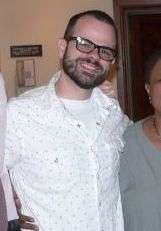Jay Bakker
| Jay Bakker | |
|---|---|
 Bakker in 2007 | |
| Born |
Jamie Charles Bakker December 18, 1975 Charlotte, North Carolina, U.S. |
| Residence | Minneapolis, Minnesota, U.S. |
| Nationality | American |
| Occupation | |
| Spouse(s) |
|
| Parent(s) | |
| Website | Revolution Church |
Jamie Charles "Jay" Bakker (born December 18, 1975) is an American pastor, author, speaker and theologian. He is the son of televangelists Jim Bakker and Tammy Faye Bakker Messner.
During his young adult years Bakker became disillusioned with mainstream Christianity, becoming particularly critical of Christian fundamentalism and the Christian right.[2] He later adopted a much more liberal form of Christianity and became a co-founder of Revolution Church, which was created in 1994 in Phoenix, Arizona.[3] Bakker then preached at Revolution's Atlanta location before pastoring the New York City branch of Revolution Church, which held services at the bar and venue Pete's Candy Store, in the Williamsburg section of Brooklyn until Bakker relocated to Minneapolis in 2013 and began pastoring another iteration of Revolution Church there. Much of Bakker's story was retold in a documentary on Sundance Channel called One Punk Under God: The Prodigal Son of Jim and Tammy Faye. His story has also been chronicled in Time Magazine.[4]
Early life
Bakker was born December 18, 1975[5] in Charlotte, North Carolina to Christian televangelist pastors Jim Bakker and Tammy Faye Bakker (née Messner).[5]
In 1988 when Bakker was twelve years old, his father Jim was indicted on eight counts of mail fraud, 15 counts of wire fraud and one count of conspiracy[6] and spent six years in federal prison.[7]
The trauma of his father's imprisonment, combined with the subsequent ostracism by others in the Church and religious community, led Bakker to engage in a period of substance abuse and partying during his young adult years.[8] During his youth Bakker had become deeply distrustful of other ministers and viewed televangelist Jerry Falwell to be instrumental in ruining his family. In his autobiography, Son of a Preacher Man, he claims Reverend Falwell deceived his father into relinquishing PTL and auctioned off much of the church's property, including some of the Bakker family's personal possessions that were left there. After becoming sober, he re-examined his faith and Christianity, adopting a philosophy that God is a loving and accepting entity rather than a judgmental one. Among those who have been significant influences on his thinking are Brennan Manning, Paul Tillich, Martin Luther King Jr. and Peter Rollins.
Political and social views
Bakker has advocated for a much more open, inclusive Christianity, which embraces those with alternative lifestyles and encourages doubt and uncertainty. He has also endorsed gay marriage and has been an advocate for the church's acceptance of the LGBTQ community. He has also questioned traditional interpretations of the atonement and salvation.[9][10] When asked by Larry King if he was "part of the liberal sect of Christianity," he said that he was "more liberal than most".[11] He also decries the influence of politics in religion, saying that it prevents civil discussion of topics such as homosexuality and abortion.[12] Bakker's church used rainbow-colored communion bread to celebrate the legalization of gay marriage in Minnesota.[13]
Bakker's appearance is non-traditional and includes piercings and tattoos. Because of his philosophy and appearance, his followers and associates tend to share these qualities of coming from outside of conservative Christianity.
Appearances in media
In 2001, Bakker wrote the book Son of a Preacher Man: My Search for Grace in the Shadows which is an autobiography that details his youth, relationship with his parents, the PTL scandals, and the founding of Revolution Church.[14]
In 2006, he was featured in the six-part documentary One Punk Under God on the Sundance Channel.
He has appeared on Larry King Live and The Joy Behar Show (August 23, 2011) and has been featured in Rolling Stone, The New York Times, Time, The Economist, FHM and New York Magazine.
In 2011, Bakker and co-author Martin Edlund wrote the book Fall to Grace: A Revolution of God, Self, and Society. The book explores the radical, transformative, and inclusive nature of grace, challenges Christians to reassess their understanding of salvation, and encourages non-believers to see Jesus with fresh eyes.[15]
In an episode of American Scandals With Barbara Walters (aired on December 14, 2015 for Investigation Discovery), Jay Bakker was interviewed by Walters about growing up amidst the intense criticism following the fall of his famous parents and the subsequent empire they founded.
See also
References
- ↑ Jay Bakker (January 23, 2011). "Finding Jesus, in Drag". Huffington Post. Retrieved October 1, 2013.
- ↑
- ↑ Archived January 16, 2007, at the Wayback Machine.
- ↑ "Q&: Jay Bakker on Faith, Grace and Gay-Friendly Churches - TIME". TIME.com. 15 March 2011. Retrieved 6 December 2014.
- 1 2 Morris, Alex (November 7, 2010). "God Loves Jay Bakker". New York Magazine. Retrieved June 27, 2018.
- ↑ Ostling, Richard N. (December 19, 1988). "Jim Bakker's Crumbling World". Time magazine. Retrieved December 5, 2007.
- ↑ Smothers, Ronald (December 2, 1994). "Ex-Television Evangelist Bakker Ends Prison Sentence for Fraud". The New York Times.
- ↑ Archived January 16, 2007, at the Wayback Machine.
- ↑ "How Jay Bakker Is Trying to Use New York City to Save Christianity From Itself and Its Rigid Ideas -- New York Magazine". NYMag.com. Retrieved 6 December 2014.
- ↑ "Jay Bakker defies the Christian mainstream". Indy Week. Retrieved 6 December 2014.
- ↑ "CNN.com". CNN. Retrieved 6 December 2014.
- ↑ "Bakker, Brown: What the hell happened to Christianity? - CNN.com". CNN. Retrieved 6 December 2014.
- ↑ "Rainbow Communion Bread". Daily News. New York. Retrieved 6 December 2014.
- ↑ World Archipelago. "Son of a Preacher Man". HarperCollins US. Retrieved 6 December 2014.
- ↑ Archived January 20, 2011, at the Wayback Machine.
External links
| Wikimedia Commons has media related to Jay Bakker. |